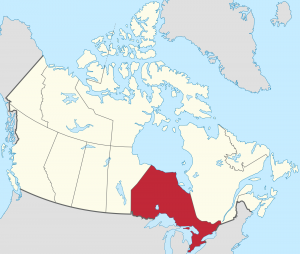
Ontario in present-day Canada (Wikipedia)
Stephen Harper might be representing Calgary Southwest, but his government hinges on Ontario – in the 2011 election, 73 of the CPC‘s 166 seats came from among Ontario’s 106 seats. Alberta contributes a paltry 27 (of its 28 seats) to the cause. This made me wonder, though I’m nigh-absolutely certain I’m not the first to wonder: Is it possible to win without winning Ontario – and therefore, from the runner-up perspective, win Ontario and not win in Canada overall? (Spoiler: Yes.)
In 2011, Ontario held 38.4% of our national population. Quebec is a distant second at 23.6%. If you didn’t get Ontario, can you win without Quebec? (Spoiler: Yes, but it’s vanishingly rare.) And finally, does getting both Ontario and Quebec ‘guarantee’ you’ll win? (Spoiler: Surprisingly, no.)
Deciding what constitutes a minority government is sometimes difficult: here’s a list of minority governments in Canada. I’m not going to spend much time distinguishing between minorities and majorities – for me, a plurality is a win. Even when it sort of isn’t.
Important note: The early elections were much different from today’s, both ethically and procedurally. I only talk about winning, not how the wins were won, if you follow me. Elections Canada has a web-book, A History of the Vote in Canada, whose second chapter talks about early elections and their questionable practices.
